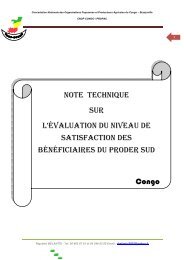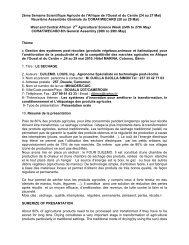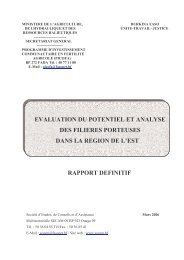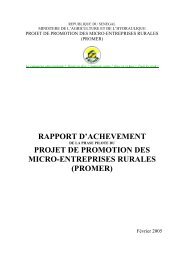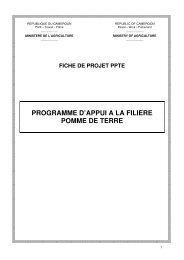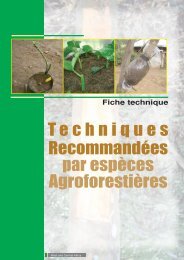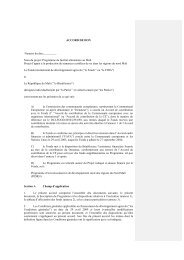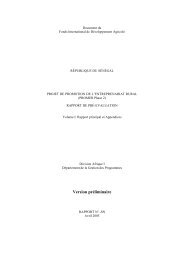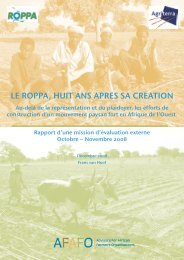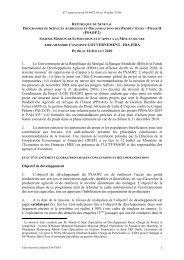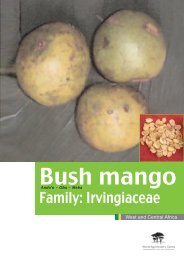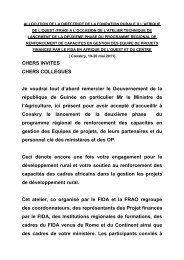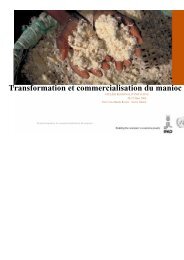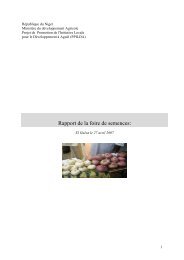Scaling Up the Fight Against Rural Poverty - FIDAfrique
Scaling Up the Fight Against Rural Poverty - FIDAfrique
Scaling Up the Fight Against Rural Poverty - FIDAfrique
Create successful ePaper yourself
Turn your PDF publications into a flip-book with our unique Google optimized e-Paper software.
Based on our interviews and document reviews, COSOPs at present play a limited role for country<br />
program management. Most CPMs and regional managers give primacy to <strong>the</strong> preparation and<br />
implementation of projects. The lack of centrality of <strong>the</strong> COSOP instrument for most countries so far<br />
becomes evident during <strong>the</strong> project Quality Assurance (QA) review process. Projects reviewed often<br />
show disconnects between <strong>the</strong> COSOP and <strong>the</strong> project. As no mechanism exists to link <strong>the</strong> project<br />
review to <strong>the</strong> COSOP, including <strong>the</strong> Quality Enhancement (QE) project review, such disconnects<br />
typically go undiscovered.<br />
But <strong>the</strong> COSOP’s marginal role is likely to change. IFAD has followed o<strong>the</strong>r international financial<br />
institutions (IFIs) and now presents projects up to a certain size for Board approval under streamlined<br />
procedures. Board members thus do not discuss each individual project, but instead focus on COSOPs,<br />
which are to provide <strong>the</strong> conceptual framework in which projects are designed. Given this change, <strong>the</strong><br />
COSOP instrument could evolve into a more central country programme instrument than is presently<br />
<strong>the</strong> case. However, given <strong>the</strong> small number of projects and <strong>the</strong> sectoral concentration of IFAD projects<br />
in any one country, it is more difficult to ensure that COSOPs play <strong>the</strong> central role which country<br />
assistance strategies have for example in <strong>the</strong> World Bank. Also, <strong>the</strong> fact that COSOPs have no<br />
apparent significance for resource allocation, ei<strong>the</strong>r in terms of lending allocations (which are<br />
governed by <strong>the</strong> PBAS process, see below) or in terms of administrative budgets, weakens <strong>the</strong>ir role as<br />
an operational planning and programming tool.<br />
4. <strong>Scaling</strong> up in COSOPs<br />
As noted earlier <strong>the</strong> COSOP guidelines address scaling up, but only in a very limited way.<br />
There is no guidance given on <strong>the</strong> definition of scaling up, nor on how to present <strong>the</strong> scaling up goal,<br />
pathways and processes. Accordingly, while most COSOPs focus explicitly on innovation, <strong>the</strong><br />
overwhelming majority of COSOPs says nothing or very little about scaling up, even in countries<br />
where <strong>the</strong>re is, in fact, scaling up happening in IFAD’s programs. 26 . Where scaling up is mentioned, it<br />
is only as a complement to innovation. Most commonly, scaling up is described as “handing off” <strong>the</strong><br />
innovation to ano<strong>the</strong>r partner or <strong>the</strong> government. For this purpose it is frequently mentioned in <strong>the</strong><br />
COSOP that a dialogue on <strong>the</strong> hand over will be conducted with o<strong>the</strong>r partners and <strong>the</strong> government.<br />
Only in exceptional cases is knowledge management linked to scaling up. Generally, IFAD<br />
interventions are presented as discreet interventions, unrelated to each o<strong>the</strong>r, with a significant effort<br />
being made to demonstrate that each of <strong>the</strong>se interventions contains innovative components. Even in<br />
those COSOPs where scaling up has been specifically addressed, pathways to scaling up have not been<br />
laid out.<br />
The Peru COSOP is an exceptional case in that it lays out a strategy that explicitly and prominently<br />
calls for a replication of innovations in <strong>the</strong> Sou<strong>the</strong>rn Highlands, where <strong>the</strong>y were originally tested, for<br />
<strong>the</strong> transfer of experience to o<strong>the</strong>r parts of <strong>the</strong> country, and for a move from project based interventions<br />
to programmatic approaches. It presents evaluation, knowledge capture and dissemination as part of<br />
<strong>the</strong> scaling-up strategy. Mainstreaming of successful processes and practices (such as competitions)<br />
and cooperation among national and international partners are key <strong>the</strong>mes.<br />
IFAD’s operational culture has been dominated by a projects-based approach to its country<br />
programming. This means that IFAD’s operational processes focus on <strong>the</strong> project, its inception,<br />
26 <strong>Scaling</strong> up concerns have been consistently raised during COSOP reviews by IFAD management through <strong>the</strong><br />
Operational Strategy Committee (OSC)- during 2009/2010. This is noted in <strong>the</strong> relevant OSC issues papers and<br />
OSC minutes, and reflected to some extent in <strong>the</strong> revised COSOP versions submitted for Board review. It will be<br />
important, however, to assess in due course <strong>the</strong> related follow up in <strong>the</strong> context of country programme<br />
implementation, as reflected in future COSOP annual reviews, portfolio reviews and midterm review reports.<br />
29



